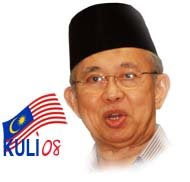Concept of Co-Leader
Early in his tenure while he was still contemplating selecting his deputy, I suggested that Abdullah Badawi ignore tradition and go beyond the then existing UMNO Vice presidents and choose someone whose skills and experience would complement his. My choice was Tengku Razaleigh. He would bring his vast experience in business and finance, precisely the areas Abdullah is sorely lacking. Abdullah should do what George Bush, Jr., did in picking Richard Cheney as his running mate. By doing so Bush acknowledged his limitations. The experienced Cheney, by reasons of age and health, could not possibly succeed or challenge Bush. Similarly, Razaleigh, by virtue of his age, would unlikely challenge or succeed Abdullah.
I suggested that Tengku Razaleigh not be treated as the traditional deputy, meaning, someone always deferring to the boss and patiently awaiting his turn. Rather he should be considered as an associate or co-Prime Minster, fully using his talent and experience for the good of the nation.
This is a tricky proposition, for the ship of state can have but one skipper. Poorly handled and with the wrong personal chemistry mix, it could result in continuous conflict. Malaysia had been through the disastrous Mahathir-Anwar rivalry. Skillfully managed however, the nation would benefit from the complement of talent and experience of its two most seasoned leaders.
Such co-leadership is common in my profession. Modern surgery is increasingly complex, requiring the skills and contributions from various specialists. Take breast cancer. Often patients want the curative cancer surgery combined with reconstructive procedures to minimize the psychological trauma. This requires the combined and complementary skills of both the general and plastic surgeons. Such instances of co-surgeons operating on the same patient simultaneously are becoming increasingly common. Yes, differences of opinions do arise, but they are resolved through discussions and compromises, always keeping uppermost the patient’s best interest. There is no place in today’s highly complex operating suites for prima donnas strutting imperiously and expecting everyone to kow tow to them.
We see similar co-leadership arrangements in big corporations. Microsoft has Bill Gates as its Chairman, and Steve Ballmer, the chief executive. You do not see them scheming to topple one another or jostling to grab the limelight. They are both confident of their own considerable abilities. Besides, they have enough on their own plate without having to bother the other.
As William Bennis observed, “Co-Leadership is not a fuzzy-minded buzzword designed to make non-CEOs feel better about themselves and their workplaces. Rather it is a tough-minded strategy that will unleash the hidden talent in any enterprise. Above all co-leadership is inclusive, not exclusive.”3
If nothing else, having a co-leader would take care of the immediate succession issue. Yes, it would take an exceptional individual to be willing to play the acknowledged second fiddle, just as it would take an equally exceptional leader to accept someone as equally capable as he is to share the podium. The personal and professional chemistry of both individuals must be right and compatible.
Bennis identifies three groups of individuals who would fit the co-leader role. First would be the “fast trackers,” talented subordinates fast on their way up, as Tun Razak was to Tunku. Second would be “backtrackers,” former chiefs who have willingly downshifted. The classic example of this was Chou En-Lai giving up the leadership of the Chinese Red Army to a gifted junior officer, Mao Zedong. Third would be the “on-trackers,” individuals who are just not interested in the top slot. They are content with their present position. Tengku Razaleigh would have been a good example, had Abdullah chosen him.
Had Abdullah picked Tengku Razaleigh, Abdullah would have strengthened his leadership team. With their combined strength and integrity, they could have revamped the cabinet and together groomed the next generation of leaders. At the very least, with Razaleigh at his side, Abdullah would not look overwhelmed with all the problems. One sure way for a leader to lose his or her effectiveness is to appear beleaguered.
As events later proved (in particular Mahathir’s relentless criticisms of Abdullah’s leadership that came out in the open in late 2006), Abdullah was then under considerable pressure from Mahathir to name Najib Razak as Deputy Prime Minister. Unfortunately both Abdullah and Najib have no love or much respect for each other. More importantly, each does not bring any complementary quality to the top leadership team. By late 2006, both looked pathetic in the face of criticisms from Mahathir and others.
Tuesday, January 15, 2008
Subscribe to:
Post Comments (Atom)


No comments:
Post a Comment